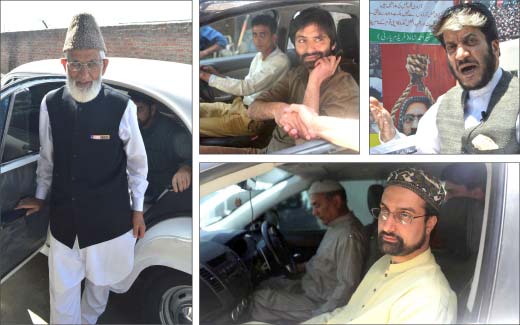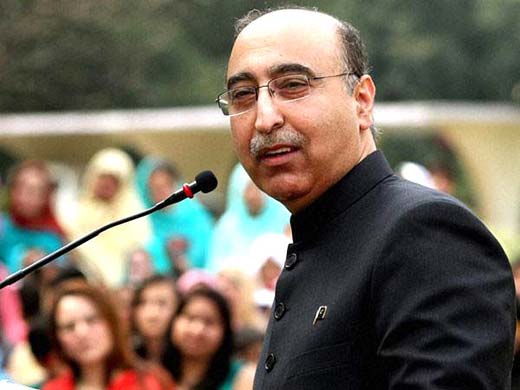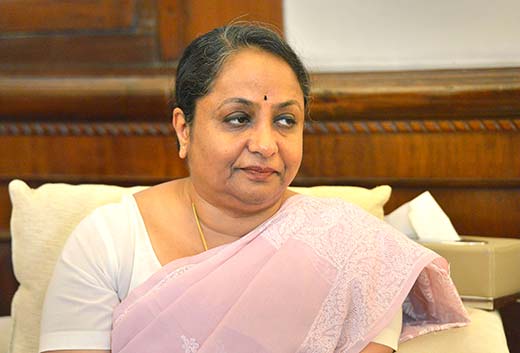The camaraderie created by Modi after inviting Pakistan premier on his oath-taking ceremony turned out to be short-lived as India cancelled the foreign secretary level talks on a pretext that has been a norm during the last two and half decades. Shah Abbas brings to fore the internal and external connotations of the unceremonious move by New Delhi
 Within the first hundred days of the first ever government of Hindu nationalists in New Delhi, led by Narendra Damodar Modi, the term “secularism”, though ambiguous, missing from the discourse generated in state functions and state run media.
Within the first hundred days of the first ever government of Hindu nationalists in New Delhi, led by Narendra Damodar Modi, the term “secularism”, though ambiguous, missing from the discourse generated in state functions and state run media.
The term has been a “mantra” of every political dispensation in mainland India, the Vajpayee regime being no exception..
Apart from this meaningful change on the internal front, India in the second week of August took a large step by calling off bilateral talks with its immediate neighbour, Pakistan. Most of the analysts opine it as “aggression” on part of Modi. There are commentators who call this act as “detrimental to the image of Modi” which had been created when the SAARC country heads were invited on his oath taking ceremony. “Involving SAARC to the oath taking of Indian Prime Minister for the first time was an effort to have an upper hand in the regional organisation but one wonders as to how Modi can fulfil this dream without taking Pakistan into confidence,” Showkat Parray, a political science scholar told Kashmir Life.
Sharief had even risked criticism by accepting the invitation of Modi to attend his oath taking ceremony. The bonhomie was such that Sharief later sent a Sari to Modi’s mother as a gift, while Modi sent Sharif’s mother a shawl. They had also agreed tentatively to meet in New York next month at the UN General Assembly.
Known for his anti-Pakistan stance, Modi too was criticised by many quarters for inviting his Pakistani counterpart. Many in India believed that the latest move was also aimed at “silencing” those quarters.
There are analysts who firmly believe that Modi government has hardened its stance on many issues on the external as well as internal fronts. “Modi seems to have changed the track and hardened his stance,” senior Journalist and analyst Mohammad Sayeed Malik told Kashmir Life, however, Sayeed does not call the “changing of track” as “aggression” on part of Modi. “This is change of strategy not aggression,” Sayeed said.
The supposedly tough stance taken by Modi has certainly gone down well with much of the Indian state media, especially some of the jingoistic television anchors. After India formally announced that it was cancelling the talks, one of the anchors could be seen shouting at the Pakistanis on his show, “it is no longer business as usual”.
The decision of calling off the Foreign Secretary Talks with Islamabad was not sudden. Modi, had started talking against Pakistan even before. During his Ladakh visit, he outrightly accused Islamabad of being busy “in a proxy war in Kashmir after it lost the capability of a conventional war.” This statement of Modi came from the same land where New Delhi claims its forces have defeated Pakistan in 1999.
The bilateral talks have not been suspended for the first time between New Delhi and Islamabad. It has its own history of crests and troughs. Lastly the talks were suspended after Mumbai attack and the bilateral relations came to a record low. But this time it is clearly Kashmir, which has put a break on the Indo-Pak “agenda less” talks.
Modi is reported to have called off the Foreign Secretary-level talks between India and Pakistan in consultation with External Affairs Minister Sushma Swaraj, at about 1:30 pm on August 18. It had been decided that the talks would be called off if Pakistan High Commissioner Abdul Basit went ahead with his meeting with Hurriyat leader Shabir Shah at 4 pm.
Reports said that the Ministry of External Affairs (MEA) officials were not kept in the loop. Foreign Secretary Sujatha Singh was informed after the decision was taken, who then called up Basit at about 2:30 pm and told him that the talks would be called off if he met Shah.
Reports added that soon after Basit’s meeting with Shah was over at about 5 pm, Sushma consulted Modi, and then told MEA officials to announce the decision to cancel the talks. Singh did not call up Basit again to inform him about the cancellation of talks. Instead, the MEA’s official spokesperson was asked to make the announcement public.
However, analysts like Sayeed believe that “The reason they (New Delhi) cited for cancellation of talks is not convincing, and the actual reason seems something else.”

It has been a tradition of sorts for Kashmiri separatists to meet the Pakistan High Commissioner in New Delhi or any Pak dignitary visiting the country for any talks between the two countries. This time too, ahead of the crucial foreign secretary-level talks scheduled for 25 August, it was only a matter of routine that some of the separatist leaders would be travelling to Delhi to visit the Pakistani high commission. The congress stand on the issue was strange. The party opposed the separatists meeting Basit, despite the fact that it never reacted against such moves during its last two terms in government.
When Modi government came out with the decision, it silenced the Congress. Many are of the opinion that BJP has an eye on the upcoming J&K elections and the move of stalling talks with Pakistan will help the party to please the “extremist elements” in Jammu region. “Calling off talks after Modi had himself exhibited camaraderie by inviting Pakistan Premier Nawaz Sharief on his coronation ceremony is nothing but a poll plank to please the anti-Kashmir extremist Hindu and Dogra vote bank of Jammu,” Tariq Ali Mir, a Srinagar based journalist told Kashmir Life.
Modi’s calling off talks is however, strongly opposed by some political voices in Jammu as well like Professor Bhim Singh. Singh, who strongly supports a separate statehood for Jammu, dubbed the move to cancel talks as “total bankruptcy” of think tank in the South Block.
“The Hurriyat leaders in Srinagar are occasionally rather frequently detained inside their houses even on the Fridays to stop them from attending religious congregations. Why then government allowed them to attend official meeting with the High Commissioner of Pakistan in New Delhi if such a meeting was not in the interest of the security of the state,” asked Patron of NPP.
He described the decision of the government to cancel the talks with Pakistan as “highly undiplomatic and unnecessary. The move displays lack of courage and wisdom to continue confidence building measures with our neighbours so that the problems could be settled amicably and peacefully.”
At a time when Pakistan is facing a precarious situation, many analysts believe the move is aimed at pressurizing Pakistan. India considered it opportune time to twist Pakistan’s arm when the opposition is all out to throw the Nawaz government out of Parliament coupled with the problem crisis created by the military engagement with Tehrik e Taliban.
It is also said that Modi wanted to break the tradition of meetings between Pakistanis and separatists on the Indian soil going on since 1995 when President Farooq Leghari came to New Delhi during Narsimha Rao’s government.
Sources said that Modi is told that Sharif was not going to last long. And if the information was right then as a traditional rival it was “right time” for India to break the tradition of using Indian soil for meeting separatists and Pakistani leadership.
Here in the valley, separatists are posing themselves as winners after the talks were called off. The separatists who were living almost in hibernation since last Lok Sabha polls suddenly came into limelight and were seen on TV screens and media conferences condemning the move as if Kashmir issue was on the top agenda in the talks. “Separatists are behaving as if Azadi was on cards and it was to be declared just after the talks of Sujata Singh and A A Chowdhary,” Mir said, adding “These people must know that India and Pakistan are two sovereign countries and can do anything, but this time they must be thankful to Modi sarkaar which used their meeting Pak diplomat only to please Jammu people which gave them a lot of media coverage.” The calling off talks with Pakistan even provided opportunity to old and ailing separatist leader, Syed Ali Geelani to thank Pakistan for “preferring Kashmiris over India.”
Pertinently, despite the cancellation of the talks, Pakistan High Commissioner in New Delhi pushed ahead with its meeting with the Kashmiri separatist leaders. Among those he met was 85 years old Syed Ali Geelani, Mirwaiz Umar Farooq, Mohammad Yasin Malik and Shabir Ahmad Shah. When Geelani was asked whether he and other separatists were responsible for derailing the peace talks, he replied, “Since 1952, there have been more than 150 different dialogues. Nothing has ever been achieved because India in one breath says it is ready for talks, and in the next says Kashmir is not a disputed area.”
Modi is also facing severe criticism for calling off the talks with Pakistan within his own country.
A senior congress leader and writer Mani Shankar Aiyar, called the act as “childish”. “In a childish display of extreme petulance, the India-Pakistan foreign secretary-level talks have been called off. The excuse proffered is that the Pakistan envoy had met with Kashmiri separatist leaders…,” wrote Shankar.
Saying that working out a viable relationship with Pakistan is in India’s vital interest, Shanker further writes, “But the wholly bogus nature of the Narendra Modi-Nawaz Sharif bonhomie on the occasion of Modi’s republican coronation now stands revealed in all its nakedness.”
Shanker alleged India of running away from the bilateral talks with its next door neighbour, Pakistan. “In actual fact, India, much more than Pakistan, especially in recent decades, has shied away from bilateral dialogue….,” Shankar wrote.

Shanker further maintained that New Delhi is not sure why it is talking to Pakistan at all and it is not sure why it broke off talks. “I am sure the talks will resume within the next 12 months, but once more we won’t know why we are doing it. Narendra Modi is on the same wrong track as the UPA on Pakistan,” he said.
The fact of the matter is both New Delhi and Islamabad want Kashmir without knowing what Kashmiris want. “Kashmir is not any border dispute between India and Pakistan but question of political future of more than one crore people,” said Shabir Shah. According to his close associate Nayeem Ahmad Khan, “India does not want peace; it thinks that accepting peace means its defeat and that is why New Delhi is repeatedly shying away from the historical facts related to Kashmir dispute.”
Many commentators are of the view that India and Pakistan are not sincere in dialogue. They have been talking not to solve anything, but to tell the world that they are talking. These commentators like all the separatists to strongly advocate the participation of Kashmiris in the dialogue. Encouraged by such impartial comments Geelani has said repeatedly, “There have been more than 150 bilateral talks between India and Pakistan but nothing came out and not a single issue was resolved only because Kashmir is the basic dispute so it must be resolved first by implementing UN resolutions or a tripartite dialogue process.”
India has not only closed doors for bilateral talks with Pakistan (for the time being) but also rejected any kind of dialogue with the separatists at least in near future. Union Defence minister Arun Jaitley, during a visit to Jammu in the middle of June, had announced that the government was willing to talk to anyone in Kashmir provided “it was within the framework of the Constitution”.
Analysts are of the opinion that there is no one in India who can talk outside the Constitution. Even former Prime Minister P V Narasimha Rao’s “sky is the limit” in late 1995 implied a “sky” within the Constitution, former Prime Minister Atal Bihari Vajpayee’s “insaniyat ka daira” was within the scope of the Constitution and Manmohan Singh’s meetings with moderate Hurriyat leaders were also called “within the ambit” of constitution.
And in a situation where the “main stake holders” (Kashmiris) are not willing to talk within the ambit of the Indian constitution, how the issue is to be resolved? When Kashmir Life put the same question before Nayeem Khan, he replied, “In a situation created by India a third party intervention is inevitable.”
What Jaitley said in Jammu was an attempt to tell the separatists that there was going to be no negotiation with them. And that if they wanted to talk then they would have to fall in line with unionists. “The political leadership of India is using the same rhetoric ever since the Kashmir dispute was created, what did New Delhi achieve? It had to kill thousands of Kashmiris but the problem is still there, so it will remain till India accepts that Kashmir is a disputed region,” Khan said.
By calling off talks with Pakistan, according to many commentators, Modi has given the impression that India is reluctant about solving issues and problems with its neighbour. Pertinently, in 1997, Prime Minister Inder Kumar Gujral managed a breakthrough by starting the first India-Pakistan composite dialogue.

Modi’s cancellation of talks with Pakistan goes against the spirit of the composite dialogue, which requires both countries to be willing to do some uncomfortable things. As part of these negotiations, there have been meetings of Pakistani leaders and diplomats with Kashmiri separatist before every new round of talks, to listen to what they have to say.
Modi’s “needless cancellation” of his government’s first dialogue with Pakistan, over a meeting with Kashmiri separatist leaders, is likely to weaken the peace lobbies in both India and Pakistan, making it difficult for them to argue with those who want permanent hostility. The anti-India lobby in Pakistan will now present India as the one which does not want peace and resolution of outstanding issues.
Indian argument is that Kashmiris are no stakeholders of their own issue and it is up to New Delhi and Islamabad to decide about it bilaterally. New Delhi cites Shimla Agreement as proof to its argument.
Simla Agreement signed by the then Prime Ministers of India and Pakistan, ratified the bilateral nature of Kashmir issue. The same was reaffirmed in the Lahore Declaration of 1999 between PM Nawaz Sharif and PM Vajpayee,” said a statement issued by the MEA. However, India time and again has gone against this argument by talking to even militants and moderate separatists.
According to Zaffar Akbar Bhat, a militant turned political activist, “While recognizing Hizb-ul-Mujahedin as a party to the Kashmir dispute, BJP-led government through the then Home secretary Kamal Panday held talks with the militant group which was appreciated by state department of US, UK, Russia, China and others.”
He said, “holding talks with armed group was an endorsement of the fact that Kashmir belongs to Kashmiri people and hence are primary and legitimate stake holders of the dispute”. The separatists also reaffirm that if Kashmir is a bilateral issue between Indian and Pakistan, what is United Nations Military Observers Group on India and Pakistan (UNMOGIP) doing in Srinagar?
When Sharif was elected in 2013, and amid expectation that Modi was very likely to be elected a year later, there was optimistic talk that the two men could do business. Many believed Modi, secure with his landslide win, had more chance of dealing with Pakistan than many of his predecessors. But all went in the air by an announcement of New Delhi leaving those who work on track II with nothing but crossed fingers.
All eyes will be now on Modi and Sharif when they travel to New York next month. They could surprise all by a meeting but the latest events have made the exchange of bonhomie between the two premiers difficult.
















You got to push it-this esstaeinl info that is!